
Number 48
In this issue:
- Shutting down the capital
- Final push against UK fracking
- Gilets Jaunes: “We must exit capitalism”
- Judi Bari: an orgrad inspiration
- For an anti-sectarian revolutionary left
- “The Land Shall Sink”
- Acorninfo
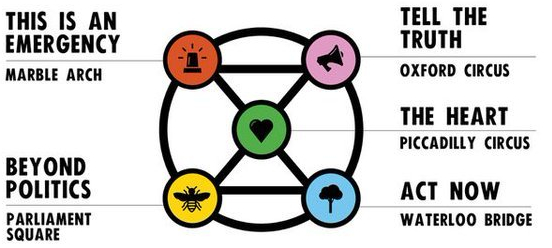
Eco-protesters are planning to bring London to a standstill from Monday April 15.
Supporters of Extinction Rebellion (XR) aim to block traffic at four central locations “around the clock” to highlight the urgent issues of climate change and wildlife declines.
They will take to the streets from 11am at Marble Arch, Oxford Circus, Waterloo Bridge and Parliament Square.
As part of an international day of protests, thousands of people will converge on the four busy locations in the UK capital, blocking traffic and creating a festival of action including people’s assemblies, performances, talks, workshops and food.
And the idea is that they be will back the next day, and the day after that, for up to two weeks. Unless, of course, the UK state suddenly sees the light and decides to dismantle the industrial capitalist system.
Say XR: “Under our current system, we are headed for disaster. Catastrophic climate breakdown will cause food collapse, destroy communities, kill millions, and render many more homeless.
“Mass extinction of wild species will lead to ecological collapse, and when they go, we go. Destruction of natural habitats will lead to genocide of indigenous peoples and the loss of our planet’s life support systems”.
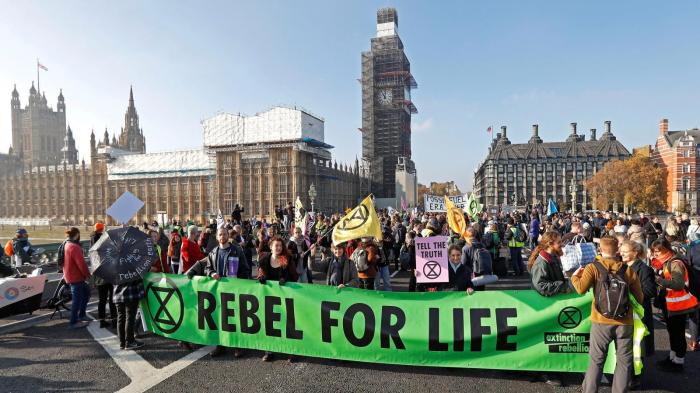
As we reported in Acorn 45, XR’s first big day of action was on Saturday November 17 2018, when some 6,000 people took to the streets of London.
While recognising XR’s amazing success in mobilising people, some activists who have “doubts about some of the tactics that XR has adopted” (see Acorn 47) have announced a parallel mobilisation.
The Green Anti-Capitalist Front is calling for like-minded folk to gather at 12 noon on Monday April 15 outside St Paul’s Cathedral.
They add: “We will be assembling at St Paul’s for a tour of the heart of global extractive finance, also known as the City of London.
“Unlike Extinction Rebellion, we are not asking you to get arrested but we must highlight the fact that capitalism is the root cause of this crisis and bring this message to the workplaces of the people profiting from environmental destruction.
“We are calling for all anti-capitalists to join us on the street and show that London is both red and green”.

For our part, The Acorn would add that the only real way to solve the environmental crisis is to end the global industrial capitalist system.
Governments, which are a central part of that system, are not going to do that, no matter how loudly we ask them. The people will have to do it for themselves!
2. Final push against UK fracking!

Is the tide finally beginning to turn in the battle to stop fracking in the UK?
That was the hope sparked on April 3 by the dramatic legal victory against the draconian injunction used by fracking firm Ineos to try and stop legal protests.
The court of appeal struck out the sections applying to protests on the public highway, including slow walking protests, climbing on to vehicles and blocking the road. It also removed the section on protests against the supply chain.
The ruling declared: “The citizen’s right of protest is not to be diminished by advance fear of committal except in the clearest of cases.”
Joe Corre, one of the frack-free campaigners involved, told The Independent: “I’m pretty confident we’re going to win this war, and we are not going to have fracking in this country.
“But because they have invested so much time and energy and money into this, they are not going to go quietly, so we’re going to have to double down, up our efforts and finish them off.”
Campaigns like Extinction Rebellion and the French Yellow Vests have been effective because of the sheer numbers of people taking part, from a diversity of backgrounds.
The last push against fracking will only be successful if it is not left to the same hardy but weary group of activists who have been fighting the cause for years.
The fracking industry is well aware of the massive public opposition to its nature-destroying activities and Ineos representative Tom Pickering seemed to be in panic mode when he denounced campaigners, claiming: “We stand for jobs and opportunity. They stand for anarchy in the UK”!

The main focus in the English battle against fracking is currently in the north. Cuadrilla’s shale gas site in Lancashire is paused, but there is still some activity there and regular protests.
Rathlin Energy’s “tight oil” site at West Newton, near Hull in East Yorkshire is planning to use acidisation.
At the IGas shale gas exploratory site in Mission Springs, Nottinghamshire, horizontal drilling is due to begin soon, then fracking.
A solidarity day is being staged at the gates there on Monday April 22, from 10am. Say Mission Springs campaigners: “We will have music, speakers, cake and hopefully beautiful sunshine!”
It is crucial for the future of the English countryside, and indeed of the living planet, that the fracking industry is kept on the run.
As one online frack-free bulletin declares: “Could 2019 be the year fracking is finally consigned to the dustbin of history?
“Well, that all depends on what each one of us does to make sure that it is! After all, fracking is stoppable, another world is possible!”

3. Gilets Jaunes: “We must exit capitalism”
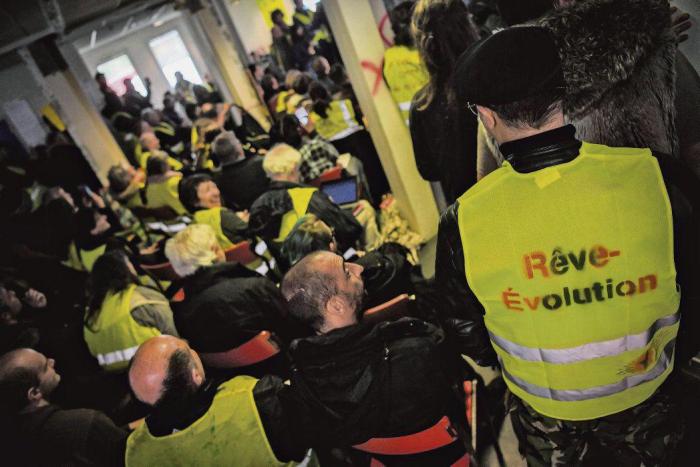
On the weekend of April 5-7, more than 800 Yellow Vest delegates from all over France gathered in the town of Saint-Nazaire for the second Assembly of the Assemblies of the Gilets Jaunes movement.
At the same time as occupying roundabouts, blocking roads, liberating motorway toll booths and filling the streets of French cities and towns every Saturday since November, the astonishing Gilets Jaunes have also been experimenting with a system of direct democracy.
A call was issued at the end of the assembly, which will now be sent back down to more than 300 local groups for their approval.
Our comrades at yellowvests.wtf have published this English translation of the call.
Sunday, April 7th, 2019
We submit this call for adoption by vote of the local assemblies.
We, Yellow Vests, constituted as an assembly of our local assemblies met in Saint-Nazaire on April 5th, 6th, and 7th 2019.
We address the people as a whole.
Following the first assembly in Commercy, two hundred delegations continued their fight against liberal extremism and for freedom, equality, and fraternity.
The struggle has taken root to overturn the system embodied by Macron! This despite the government’s escalating repression: the laws that worsen everyone’s living conditions, that destroy rights and freedoms. The only response to the movement embodied by the Yellow Vests and other struggles was government panic – and an authoritarian turn. For five months now across France we have continued: on the roundabouts, in parking lots, in the squares, at toll booths, in the streets, and in our assemblies. We have continued to debate and fight against all forms of inequality and injustice, for solidarity and dignity.
We demand:
* A general increase in wages, pensions, and welfare.
* Public services for all.
Our solidarity in this struggle is with those nine million who live below the poverty line. Fully aware of the environmental emergency we declare: end of the world, end of the month, same logic, same fight.
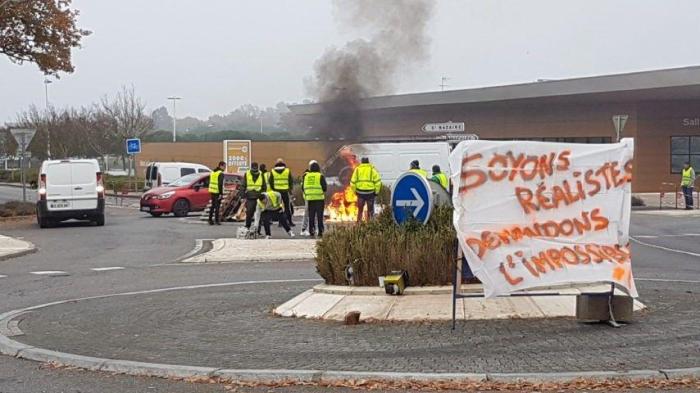
Faced with the masquerade of “great debates” and a non-representative government who serve a privileged minority, we are putting into place new forms of direct democracy.
In concrete terms, we recognize that the Assembly of Assemblies can take up proposals from the local assemblies and issue resolutions as did the first Assembly of Assemblies at Commercy. These resolutions are then systematically submitted to the local assemblies for approval. The Assembly of Assemblies reaffirms its independence from political parties, trade unions, and any self-proclaimed “leaders”.
For three days in plenary session and in working groups, we all debated and elaborated proposals for our demands, actions, and means of communication & coordination. Planning for the long-haul, we decided to organize the next Assembly of Assemblies in June.
The Assembly of Assemblies calls for actions to tip the balance of power in our favor and marshal the citizenry against the system. A calendar of actions will soon be published on a new digital platform.
The Assembly of Assemblies calls for new, expanded, and strengthened sovereign citizens’ assemblies. We call on the Yellow Vests to echo this call and the outcomes of our Assembly’s work. The results of our plenary deliberations will feed into the actions and reflections of the local assemblies.
We are making several appeals: on the European elections, the local popular citizens’ assemblies, against repression, and for the annulation of penalties against the movements’ condemned & imprisoned. We believe it is necessary in the next three weeks to mobilize all the Yellow Vests and convince those yet unpersuaded. We call for a Yellow Week of Action starting the first of May.
We invite all those who wish to put an end to the monopolization of life to fight against the current system, to create together by all necessary means a new social, ecological, and popular movement. The multiplication of ongoing struggles calls us to seek united action.
We call for a collective fight at every level across the territory to guarantee our social, economic, ecological, and democratic demands. Knowing we must fight a global system, we must exit capitalism. This way we can collectively build the famous “all together” that we sing and that makes everything possible. We are all building together across the territory.
The power of the People, by the People, for the People.
Don’t watch us, join us.
– The Yellow Vests’ Assembly of Assemblies

For more Yellow Vest translations, reports and articles see our Gilets Jaunes page.
4. Judi Bari: an orgrad inspiration

A new website has been launched which challenges “to the core” the thinking of the industrial capitalist system. It presents the ideological alternative of an organic radicalism which it sources from a wide range of thinkers, past and present.
This philosophy, explains the orgrad site, is based on the idea of a living community, a social organism consisting of “horizontal relationships and exchanges between free human beings, rather than on sterile hierarchy”.
We at The Acorn very much identify with this tradition – hence the change in our masthead! Below we reproduce the article on Judi Bari, one of dozens of profiles of key orgrad inspirations on the site.

Judi Bari (1949-1997) was an American feminist and environmental activist, who organized Earth First! campaigns against logging in the ancient redwood forests of Northern California in the 1980s and ’90s.
There was a car bombing attempt on her life in 1990.
In ‘The Feminization of Earth First!’ in 1992 she recalled: “I was attracted to Earth First! because they were the only ones willing to put their bodies in front of the bulldozers and chainsaws to save the trees. They were also funny, irreverent, and they played music.
“But it was the philosophy of Earth First! that ultimately won me over. This philosophy, known as biocentrism or deep ecology, states that the Earth is not just here for human consumption.
“All species have a right to exist for their own sake, and humans must learn to live in balance with the needs of nature, instead of trying to mold nature to fit the wants of humans”. (1)
In a 1998 essay, ‘Revolutionary Ecology: Biocentrism & Deep Ecology’, Bari went into greater depth about her ideological position.
She wrote: “Starting from the very reasonable, but unfortunately revolutionary concept that social practices which threaten the continuation of life on Earth must be changed, we need a theory of revolutionary ecology that will encompass social and biological issues, class struggle, and a recognition of the role of global corporate capitalism in the oppression of peoples and the destruction of nature.
“I believe we already have such a theory. It’s called deep ecology, and it is the core belief of the radical environmental movement”. (2)
She stressed that the central importance of nature exists independently of whether humans recognize it or not: “And the failure of modern society to acknowledge this – as we attempt to subordinate all of nature to human use – has led us to the brink of collapse of the earth’s life support systems”. (3)
Bari shared the core organic radical understanding that basing a political belief system on “ancient native wisdom” is, in the context of today’s industrial society, “profoundly revolutionary, challenging the system to its core”. (4)

She rejected as absurd the idea that human beings could “own” parts of the earth and explained that because capitalism is based on private property it is “in direct conflict with the natural laws of biocentrism”. (5)
Bari was defiantly revolutionary, declaring: “This system cannot be reformed. It is based on the destruction of the earth and the exploitation of the people.
“There is no such thing as green capitalism, and marketing cutesy rainforest products will not bring back the ecosystems that capitalism must destroy to make its profits. This is why I believe that serious ecologists must be revolutionaries”. (6)
She was unimpressed by the Marxist disregard for nature and emphasis on industry. Bari contrasted its centralism and statism with a decentralised left-wing organic model for human societies.
She insisted: “Ecological socialism would mean organizing human societies in a manner that is compatible with the way that nature is organized. And I believe the natural order of the earth is bioregionalism, not statism. Modern industrial society robs us of community with each other and community with the earth”. (7)
Bari saw clearly the links between patriarchal and industrial-capitalist ways of thinking and acting.
She wrote: “Contrary to this masculine system of separation and dominance, eco-feminism seeks a science of nature. And this science of nature is a holistic and interdependent one, where you look at the whole thing and the way that everything interacts, not just the way that it can be when you separate it.
“And also it presupposes that humans are part of nature, and that our fates are inseparable; that we have to live within the earth’s fertility cycles and we can enhance those fertility cycles by our informed interaction”. (8)

1. http://historyisaweapon.com/defcon1/barifemef.html
2. http://www.judibari.org/revolutionary-ecology.html
3-8. Ibid.
5. For an anti-sectarian revolutionary left

The 10 hypotheses below were published recently by the Radical Education Department, an autonomous US-based collective “dedicated to the construction of a radical internationalist Left through the training and federation of its cultural warriors”.
They stress that they are not meant to serve as rigid principles but are part of an ongoing attempt to develop tactics and strategies that will maximize collective anti-capitalist power.
1. Our historical conjuncture is characterized by the widespread victory of global capitalism, which has succeeded in oppressing and exploiting the overwhelming majority of the world’s population, while simultaneously destroying the biosphere at an unprecedented pace. As we are given daily lessons in what the “end of history” actually means, it is increasingly urgent that the entire spectrum of the anti-capitalist Left find ways of working together in order to build collective revolutionary power.
2. Sectarianism divides the Left by pitting against one another individuals and groups that share a common enemy: capitalism. This is precisely why the hegemonic order has been so intent on fostering disputes and sectarian divisions within the hard Left, as the history of Cointelpro and the CIA’s psychological warfare campaigns demonstrates in great detail. “Divide and conquer” is the Establishment’s mantra.
3. Capitalism is a socioeconomic order whose history goes hand in hand with colonialism, racism, gender exploitation, ecological destruction and so forth. In identifying it as the central enemy, it is not a matter of privileging class over race or gender, as if these were all somehow separate and isolated phenomena, nor is it a question of crude economic reductionism. On the contrary, it is a matter of recognizing that capitalism has always functioned as a socioeconomic system in which racial and gender hierarchies structure the global division of labor and stratify society in such a way as to increase the exploitation and oppression of particular populations.
4. Non-sectarian revolutionary politics does not require the dissolution of communist, anarchist, revolutionary socialist, autonomist, indigenous, ecological or other radical organizations, nor does it necessitate their unification in an umbrella organization that seeks to efface the important differences between anti-capitalist groups. On the contrary, non-sectarianism simply means being open to working across traditional party and organizational alignments toward the common end of dismantling capitalism, and it can take many forms, such as the establishment of radical left coalitions on specific projects or the founding of groups and organizations that are not aligned on a single party platform.
5. Non-sectarianism does not mean the loss of a program. Instead, it should be understood as the furthering of a common negative strategy—anti-capitalism—advanced through a diversity of positive tactics, which will vary based on the precise material contexts and the groups involved. Non-sectarianism thus aims at developing a common program of capitalist abolition that does not, however, dictate the “only acceptable” tactics for contributing to it.

6. There is no definitive blueprint for an anti-capitalist social revolution. There is a complex and multi-dimensional material history from which we can learn, and there are ongoing experiments with radical social transformation. Rather than presuming that the course of the future can be predetermined, activists on the hard Left would be better served to trade in unquestioned self-assurance and dogmatism for experimental fallibilism that draws on the entire spectrum of past and present revolutionary struggles.
7. The fact that there have been deep and sometimes bloody conflicts between radical leftists in the past should not mean that we are destined to repeat them in the future. On the contrary, we should learn from these conflicts and seek out strategies for overcoming them so that we can work together against our common enemy.
8. Revolutionary politics is an ongoing process of collective labor, which is at once theoretical and practical, and it thrives on the reflexive incorporation of multiple perspectives. In order to foster counter-hegemonic power in the current conjuncture, we need all hands on deck, and collective contributions to the forging of new methods and techniques that draw on the Left’s unique ability to mobilize productive self critique.
9. Our conjuncture is in dire need of new political imaginaries that open up the horizons of possibility by tapping into the collective creativity of the entire Left, which far surpasses the capabilities of individual revolutionaries or parties. Experimentalism has always been one of the strengths of revolutionary traditions, as well as the creative ability to develop unforeseen tactics that put our enemies on their heels, if not on their knees.
10. Instead of fighting amongst ourselves as capitalism daily edges us closer to the veritable end of history, we should identify points of convergence and cultivate forms of coalitional solidarity that allow us to build collective power. This requires expanding our political imaginations beyond the restricted confines of established political ideologies and the entrenched conflicts of the past, in order to join forces in the very real and urgent task of vanquishing the dominant socioeconomic order before it definitively destroys all of us!
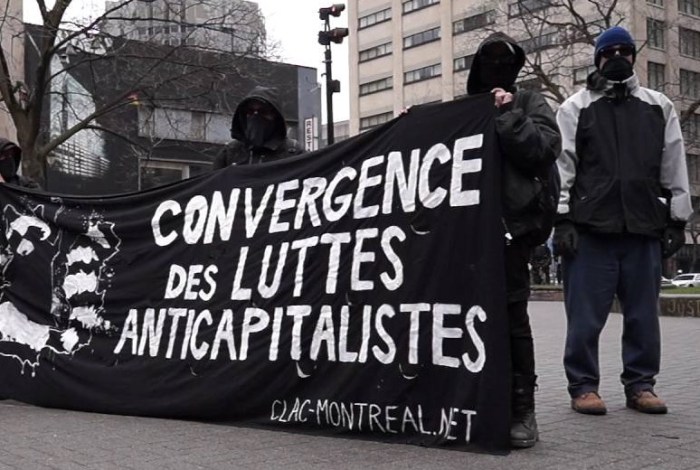

Eric Fleischmann explores the Lovecraftian nature of sea level rise.
In 1917, H.P. Lovecraft wrote the following lines in his short story “Dagon“: “I dream of a day when [the nameless things] may rise above the billows to drag down in their reeking talons the remnants of puny, war-exhausted mankind – of a day when the land shall sink, and the dark ocean floor shall ascend amidst universal pandemonium.”
Now, in the 21st century, it appears as though his unnamed narrator’s horrific vision has escaped Lovecraft’s fiction and entered into the real world.
As outlined by GlobalChange.gov, sea level is expected to rise anywhere from one to four feet by the year 2100 and only continue at the current rate or an even higher one in the following centuries.
Even small rises in sea level can have disastrous effects and, as Marine Insights reports, this poses an extreme threat to coastal areas – where almost 40% of the population in the United States resides – with flooding frequency projected to rise from 300% to 900% in comparison to what was recorded fifty years ago.
Other than the outer reaches of space there is possibly no place quite as mysterious and terrifyingly unknown as the ocean.
The National Ocean Service writes that more than 80% of this realm that covers about three fourths of our planet “remains unmapped, unobserved, and unexplored.”
The ocean has also historically presented a seemingly unfathomable dimension to reality – spawning legends of enormous beasts like Charybdis from Homer’s Odyssey, the biblical Leviathan, and the infamous kraken.

This is certainly a central reason for Lovecraft’s interest in – along with those furthest regions of space – the watery deep, which helped inspire such things as the octopus-like Cthulhu who resides in the sunken nightmare corpse-city of R’lyeh.
To be openly dramatic, when we cause sea levels to rise, we are messing with forces we do not fully comprehend.
But saying we, as many on the left have pointed out, is a misleading generalization.
Although most individuals do have substantial impacts on the environment, many major environmental issues can be traced directly to a minority of capitalists.
As the often quoted point goes: Only about 100 companies are responsible for around 70% of greenhouse gas emissions – gases which are causing the heating of the earth and consequently sea level rise.
These capitalists are akin to Obed Marsh from Lovecraft’s The Shadow over Innsmouth who, in order to obtain wealth in the form of gold and a strange “foreign kind of jewellery,” is said to have helped the undersea monstrosities known as the Deep Ones infiltrate and genetically infect the town.
The drive of global capitalism to squeeze every last cent out of the natural world is bringing the ocean to our doorsteps, just as if we were the partially complicit yet also victimized residents of cursed Innsmouth.
The aforementioned link between the heating of the earth and rising sea levels is specifically the expansion of water when it warms and the deterioration of ice sheets, but certainly the most famous such process is the melting of glaciers.
This is all well and widely known, but consider that the oldest glacial ice in Antarctica is possibly 1,000,000 years old and the oldest in Greenland is more than 100,000 years old.
This whole affair is not just about the stirring of deep and mysterious forces but also ancient ones, and perhaps no one mulled over the consequences of awakening ancient hibernating entities more than H.P. Lovecraft.

At the Mountains of Madness, one of Lovecraft’s novellas, is written as an account by the geologist William Dyer of his encounter with the strange Elder Things and shoggoths – existing in a formerly-passive state beneath the arctic – in the hope it will deter further exploration.
These creatures, like the annual 260 gigatons of water released from glaciers between 2003 and 2009, are being brought back into play, and humanity is now under existential threat because of it.
Many authors have discussed how climate change poses certain cosmic and anti-humanist threats to our anthropocentric understanding of the world.
Eugene Thacker, in In the Dust of this Planet: Horror of Philosophy (Volume 1), considers how it is difficult to think “of the world as absolutely unhuman, and indifferent to the hopes, desires, and struggles of human individuals and groups.”
But this “Cosmic Pessimism” is represented by media images of, for example, “the cataclysmic effects of climate change.”
In Hyperobjects: Philosophy and Ecology after the End of the World, Timothy Morton discusses the titular hyperobjects – objects massively distributed spatially and temporarily – in particular global warming along with several other items of ecological concern such as Styrofoam cups, plastic bags, and nuclear radiation.
According to Morton, “By understanding hyperobjects, human thinking has summoned Cthulhu-like entities into social, psychic, and philosophical space. The contemporary philosophical obsession with the monstrous provides a refreshing exit from human-scale thoughts.”

Glaciers and oceans are certainly hyperobjects and the images of their respective melting and rising can serve as some of Thacker’s representations, but sea level rise is Lovecraftian in a particularly vivid aesthetic dimension.
The ocean is an alien and largely unknown portion of the earth and glacial water is a primordial force finally being released after a slumber that has lasted eons.
In a video released a few months ago, academic internet personality ContraPoints makes the observation that one problem facing environmental activists is that climate change fundamentally lacks an antagonist.
Furthermore, an important point of Morton’s book as well as James Bridle’s New Dark Age: Technology and the End of the Future is that climate change is so vast and vague that it cannot be pinned down, quantified, or fully thought.
Bridle even derives the title of his work from a passage in The Call of Cthulhu – which he also quotes wholly within the book – that contains the line: “We live on a placid island of ignorance in the midst of black seas of infinity, and it was not meant that we should voyage far.”
In the context of this piece, this apt metaphor seems to verge on the literal. With all this in mind, perhaps a strategy of environmental thought could be to identify an antagonism within this gargantuan, undefinable, and unthinkable thing called climate change.
If we are capable of revealing a more horrifying, Lovecraftian nature to at least sea level rise, is it possible we might induce a response closer to that which would ensue if Cthulhu truly rose from the depths?

Action against the coal-mining industry is being planned in the Rhineland from June 19 to 24. Says the 2019 Ende Gelände call-out: “Last year we fought with thousands of other people in a broad alliance for the Hambi (Hambacher Forest). This year we stand side by side with all the people whose homes are being destroyed by coal and the climate crisis. In solidarity with the people from Keyenberg, Kuckum and the other villages at the Garzweiler opencast mine, we want to stop the destruction on site. Therefore we will block the coal infrastructure. This is our immediate measure for global climate justice. All villages remain – in the Rhineland and worldwide!”

* * *
Earth First! UK has announced that its 2019 summer moot will be held in north-east England from August 14 to 20. This will be a week-long camp to build a culture for active non-hierarchical grassroots ecological resistance.

* * *
June 1 2019 has been designated Global Degrowth Day by campaigners calling for a “Good Life for All”. There will be public events all over the world to share alternatives to a society based on profit and economic “growth”. People are invited to take part with their own happenings.

* * *
“Rather than engaging with the fact that capitalism itself is destructive, governments and liberal environmentalists are promoting corporate responses to the problems posed by climate change,” warns this very relevant article by Crimethinc on false solutions to global climate change. It adds: “They aren’t going to stop destroying the planet until we make it too costly for them to continue. The sooner we do, the better”.

* * *
Gilets Jaunes in the Basque country are calling for a massive mobilisation against the G7 when it meets in Biarritz in August. They will be protesting against “world leaders who defend an ultra-liberal economy which offers us nothing”.

* * *
The US state-business complex used the 9/11 “terrorism” paranoia to launch a McCarthyite “Green Scare” assault on radical environmentalists. In this in-depth article in The Intercept, Alleen Brown unveils the machinations behind the systems’s war on those it smears as “eco-terrorists”.

* * *
The dystopian nightmare of “predictive” policing is highlighted in an article by Peter Yeung on the Wired website. He writes: “The implications of being on the matrix can be chilling, but finding out why you are on it, let alone how to be removed, is extremely difficult. One family received a letter warning they would be evicted from their home if their son didn’t stop his involvement with gangs – but he had been dead for more than a year.”

* * *
“Identity politics is not liberatory, but reformist. It is nothing but a breeding ground for aspiring middle class identity politicians. Their long-term vision is the full incorporation of traditionally oppressed groups into the hierarchical, competitive social system that is capitalism, rather than the destruction of that system”. This timely and searing attack by the Woke Anarchists Collective on the curse of reformist anarcho-liberalism is now available in the online Anarchist Library.

* * *
The impact of direct action is explored in an April 2 article on the Conflict Minnesota site. It discusses how actions can produce “signals of disorder” and ripples that influence many other people. It explains: “When someone witnesses the aftermath of an action before it’s been swept away from view, or hears of an action later, the action can resonate with them, it can inspire them to act as well”.

* * *
Acorn quote: ““All life, whether social or individual, that is permanently divorced from communion with the vitalising influences of free air and sunshine, will be a stunted and diseased life”.
Henry Salt

(For many more like this, see the Winter Oak quotes for the day blog)
—–
If you like this bulletin please tell others about it. Subscribe by clicking the “follow” button.
—–
Back Issues
Follow Winter Oak on Twitter at @WinterOakPress
Reblogged this on Wessex Solidarity.
LikeLike